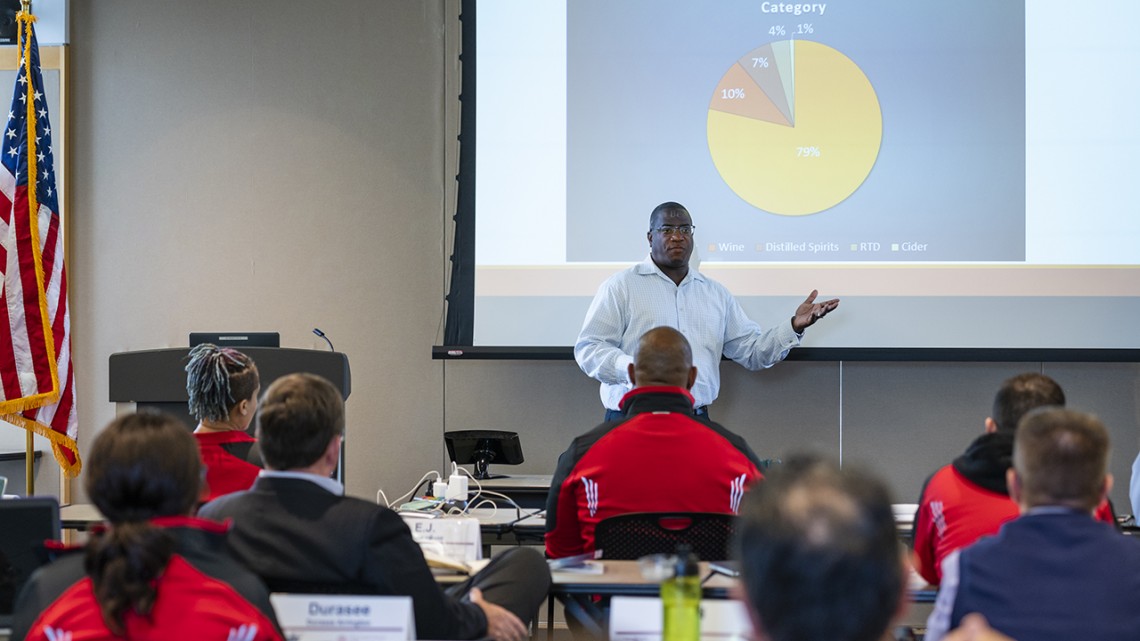
Douglass Miller, a lecturer in food and beverage management, leads a presentation on beverages and hospitality for participants at the Entrepreneurship Bootcamp for Veterans with Disabilities, hosted by the School of Hotel Administration.
Business bootcamp helps vets launch startups
By Susan Kelley
For eight years, Michael Dailey served in the U.S. Army, making sure troops were well-fed in places like Afghanistan, Iraq and Germany. When he retired in 2015 and returned home to Sarasota, Florida, he found it tough to find a positive, healthy work environment that offered career progression.
“It was pretty much going from being in charge of soldiers, leading from the front, training and mentoring people, to being all the way back down at the bottom of the barrel eight years later,” he said.
Now Dailey is a year away from opening his own food truck – serving classic Northeastern dishes like lobster rolls and Philly cheesesteaks – thanks to a free Cornell program designed to help veterans launch their own hospitality-related startups.
Dailey is one of 17 veterans who participated in the Entrepreneurship Bootcamp for Veterans with Disabilities (EBV), Sept. 29-Oct. 7, hosted by the School of Hotel Administration (SHA) and the Leland C. and Mary M. Pillsbury Institute for Hospitality Entrepreneurship.
“I go to college three days a week and I’ve never learned as much as I’ve learned in these nine days,” Dailey said. “It’s a crash-course master’s degree in a week.”
The program consists of a 30-day online curriculum focused on basic entrepreneurship skills; a nine-day residency at SHA; and a year of follow-up support and mentorship from SHA faculty and a national network of experts. Cornell is part of network of universities that offer the program at no cost to veterans.
At SHA, the vets took classes on a variety of subjects, including entrepreneurial thinking, digital media strategy, restaurant development, financing, marketing campaigns for startups and law for entrepreneurs.
“The program brings clarity,” said Vicky Adams, a 22-year Navy vet from San Antonio, Texas. She had been planning to offer premium-grade beef when she opens her food truck serving comfort-food sandwiches, wings and gravy. After EBV, she decided to go with a less expensive grade of beef and lower her prices to make them more customer-friendly.
“That was a big ‘Aha’ for me,” she said. “I was trying to give customers something that I wanted. After being here, I learned you really want to make sure you’re giving your customers what they want.”
She also learned about benefits, services and resources available to her as a vet. Each participant gets a personalized plan to help them navigate the maze of resources, such as no-interest and low-interest loans, and still maintain their Department of Veterans Affairs' benefits. The planning support comes from SHA’s partnership with the Yang Tan Institute on Employment and Disability at the School of Industrial and Labor Relations, which provided the services of Kathleen Lee, a business outreach specialist with expertise in veterans benefits.
“Our experience running this program is there is so much out there that even the people who administer the benefits sometimes don’t understand where eligibility lies,” said Neil Tarallo, director of EBV and SHA senior lecturer in entrepreneurship. “Our seven-year partnership with the Yang Tan Institute is a great example of how Cornell University comes together when there is a need.”
Dailey said getting a better grasp on those resources has been invaluable – as is the network of faculty experts that he can call on anytime.
“When I got out of the military I found it hard to adjust and adapt, and it seemed like it was me against the world,” he said. “But you find out there are people out there to help you. It just makes you feel good, because it helps make your dreams more of a reality.”
Media Contact
Get Cornell news delivered right to your inbox.
Subscribe
